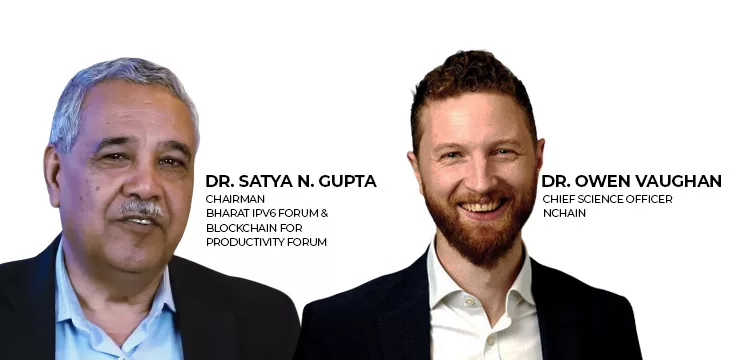|
Getting your Trinity Audio player ready...
|
The internet wouldn’t work if there were multiple versions of it, and for blockchain to work, there must be a single trusted ledger. nChain Research Chief Science Officer Dr. Owen Vaughan introduced Bitcoin SV’s (BSV) key advantages to the Indian ICT journal “Communications Today” in an interview this month with Dr. Satya N. Gupta, Chairman of the Bharat IPv6 Forum and Blockchain for Productivity Forum.
Vaughan described his role as leading a team of “research scientists who push the boundaries of what is possible using blockchain technology,” one that focuses on problems that have an impact in the real world. Though blockchains like BTC and Ethereum grab most of the headlines and attention, their shortcomings become apparent when considering the need to run large-scale applications and fit in with regulations in the financial and data-usage worlds.
The internet the world needs
To be useful, a blockchain requires three attributes that only BSV possesses: unalterable base protocol rules, unbounded scaling capacity, and minimal usage fees. Too often in the past decade or so, the attention and glamor have gone to speculative asset trading and price booms—things of little utility to anyone other than those speculating (gambling). Instead, what matters most to our data-driven future should be the ability to store, secure, and verify data according to society’s values and legal regulations.
Vaughan noted that the BSV network had processed over 10 million transactions in the 24 hours before his interview at an average per-transaction fee of $0.00001. BSV was driving applications such as the Internet of Things (IoT), social media, compliance, cybersecurity, and iGaming, which combined made up the top five transaction senders on the network.
Transparency of data ownership and usage is the reason it’s essential for the world to have a single trusted blockchain ledger. It’s not possible to achieve the levels of trust required if there are multiple ledgers, though this necessity is not always clear to the average user. Adopting new data models, particularly in data management and payments, would soon bring benefits.
“From an end user’s perspective, they will experience an increase in choice and transparency of their personal data usage. They will no longer live in a world where big companies can exploit their attention as a commodity.”
Vaughan also touched on blockchain regulations, pointing out that “most of the existing financial regulations can be translated immediately to the blockchain space.” It’s straightforward for blockchain businesses to comply with regulations such as the “travel rule,” and BSV also has compliance tools that can be patched into the software to discourage illegal activity, such as MinerID, and the Asset Recovery Tool, which can recover stolen digital property.
“It is important that policymakers are not awed by the complexity of the latest technology and not to be beholden to software developers who do not share their values,” he said.
Chance for India to lead the way in blockchain and Web3
Vaughan added that countries such as India had several opportunities to lead the world in blockchain adoption. One of these is to “leapfrog” other countries by recognizing blockchain’s superior standards earlier, while another is to develop specialist talent.
“Emerging markets, such as India, have an enormous opportunity to learn from the mistakes of others and adopt the highest quality digital infrastructure and technical standards from the beginning.”
India is second in the world in the drive to adopt IPv6, the newest version of the internet’s base protocol, with features that integrate well with BSV. It’s also a digital payment adoption leader, with the UPI payment processing service and an ongoing “eRupee” CBDC pilot.
That said, a “massive skill shortage” currently exists in the blockchain and Web3 spaces, presenting an economic opportunity for India’s large population. The industry needs a set of internationally-recognized credentials to help potential employers recruit the talent they need, especially in a world where development teams are increasingly distributed and remote-working.
If all these factors can be brought together and recognized by all as the most important aspects of blockchain technology, we can build the newest and best version of the internet. The global network we all use now was made for a past when data ownership, security, and verifiability were less important, and it’s not serving current or future needs. Web3 and blockchain, particularly the BSV blockchain, are the solution to this.
Watch: Winning acceptance for BSV in the financial world

 03-04-2026
03-04-2026 




